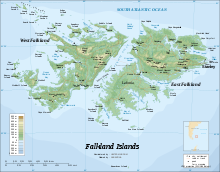
Falkland Islands English
Variety of the English language / From Wikipedia, the free encyclopedia
Dear Wikiwand AI, let's keep it short by simply answering these key questions:
Can you list the top facts and stats about Falkland Islands English?
Summarize this article for a 10 years old
Falkland Islands English is mainly British in character. However, as a result of the remoteness of the islands, the small population has developed and retains its own accent/dialect, which persists despite many immigrants from the United Kingdom in recent years. In rural areas (i.e. anywhere outside Stanley), known as 'Camp' (from Spanish campo or 'countryside'),[2] the Falkland accent tends to be stronger. The dialect has resemblances to Australian, New Zealand, West Country and Norfolk dialects of English, as well as Lowland Scots.
| Part of a series on the |
| English language |
|---|
| Topics |
| Advanced topics |
| Phonology |
| Dialects |
|
| Teaching |
| Falkland Islands English | |
|---|---|
| Native to | United Kingdom |
| Region | Falkland Islands |
| Ethnicity | 1,700 (2012 census)[1] |
Early forms | |
| Language codes | |
| ISO 639-3 | – |
| Glottolog | None |
| IETF | en-FK |
| This article contains IPA phonetic symbols. Without proper rendering support, you may see question marks, boxes, or other symbols instead of Unicode characters. For an introductory guide on IPA symbols, see Help:IPA. | |


Two notable Falkland Island terms are 'kelper' meaning a Falkland Islander, from the kelp surrounding the islands (sometimes used pejoratively in Argentina)[3] and 'smoko', for a smoking break (as in Australia and New Zealand).
The word 'yomp' was used by the British armed forces during the Falklands War but is passing out of usage.
In recent years, a substantial Saint Helenian population has arrived, mainly to do low-paid work, and they too have a distinct form of English.